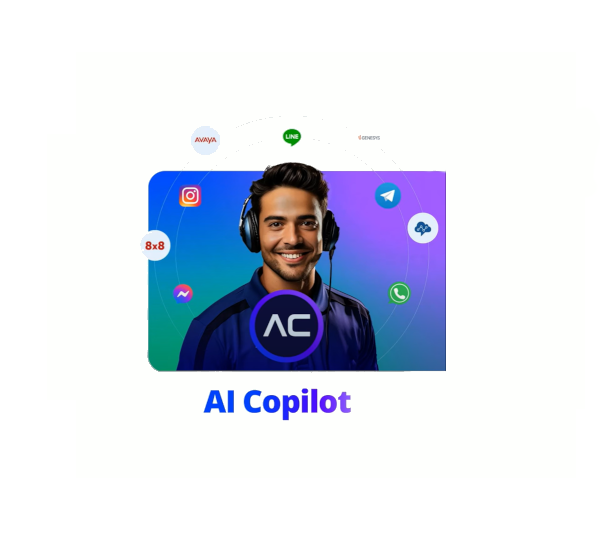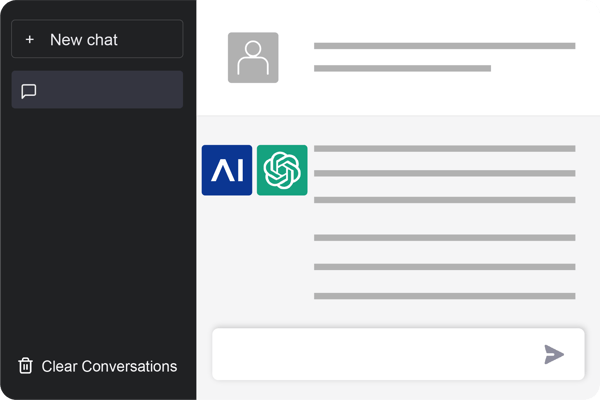Positive patient interaction is the cornerstone of a successful healthcare business.
But, as you know, providing positive interaction isn’t easy if you work in healthcare. Not only are patients frustrated and/or worried when they have to contact a healthcare provider, but the high level of demand and lack of resources make it hard for most healthcare companies to give users the experience they expect.
Technology has historically helped bridge the resource gap, with digital CRM systems and self-service portals giving healthcare businesses more efficient ways to manage patient needs.
Conversational AI is the latest evolution in healthcare technology, offering a new way to engage with patients that will reduce wait times, improve positive outcomes, and help alleviate the burden on clinicians.
If you’re involved in any type of healthcare business, be it a health insurance provider or a private medical group, you may be able to reap the benefits of Conversational AI – but only if you know what it is, how it works and how it can deliver concrete value to your business.
Related content:
- How AI Chatbots Help the Healthcare Industry
- How Conversational & Generative AI Are Transforming Customer Service in Healthcare
What Is Conversational AI in Healthcare?
Conversational AI describes a specific type of AI capable of engaging in and understanding real-time conversations with human users. Unlike outdated chatbots and other digital ‘chat’ tools, Conversational AI uses NLP (natural language processing) and ML (machine learning) to understand the context and intent behind user input. This enables the AI to respond naturally, mimicking a human conversation instead of simply spouting preprogrammed responses.
Because Conversational AI is integrated with your backend systems, it can not only identify a user’s requirements in a conversation and but then act on them where appropriate. This allows it to carry out essential service processes and simple tasks such as address changes without a need for human intervention.
How Will Conversational AI Change Healthcare?
One of the biggest pain points within the healthcare sector is user/patient experience. A combination of complex regulations, privacy laws, and the sensitive nature of health present significant barriers for users who need to contact a healthcare business for any reason.
Conversational AI promises the most potential in these stages of the patient journey, providing users with the assistance they need to solve problems without any of the traditional delays associated with the busy healthcare sector.
Benefits of Conversational AI in Healthcare
Conversational AI, when introduced in the form of an AI Agent, can instantly augment many of your core customer contact processes and help drive a range of benefits that will improve the experiences of everyone, including patients and clinicians…
Makes Patients a Priority
Patients are typically facing some form of stressor when contacting a healthcare business, so adding to that burden will only lead to a more negative outcome. Conversational AI can hold live conversations with users, meaning it can instantly answer phone calls and begin talking to a patient, understanding their needs and resolving their issues – all with human-like responses and the autonomy to action things like appointments or document capture.
Patients who access a Conversational AI will have their needs met faster and more effectively, as opposed to having to wait onI hold to speak to a human agent.
If your AI Agent utilizes a combination of Conversational AI with Generative AI, you can also record a full transcript of each patient interaction and then create a summary to be filed against the patient’s records. This summary can include parameters like sentiment analysis, allowing you to carry out large-scale reporting/analysis to track patient satisfaction over time.
Streamlines Standardized Tasks
Many of the most time-consuming tasks in a healthcare business involve mundane tasks like updating patient records, managing appointments, and filing/retrieving documentation. An AI Agent using Conversational AI, such as those offered by Cognigy.AI, will come with pre-trained knowledge about these standardized processes gathered from other healthcare businesses.
After a brief integration period, you can configure it to take a leading role in many of these processes, accomplishing them without human intervention. This not only cuts down patient waiting times and speeds up satisfactory outcomes, but also alleviates the burden on human staff…
Focuses Your Resources
The healthcare industry is one where demand almost always outstrips supply – especially in terms of having enough expert employees to carry out the critical duties demanded in this sector.
To balance your resources correctly, you need to focus your employees on accomplishing the critical tasks they are trained for. You don’t want doctors having to spend 10 minutes after every appointment updating patient records.
With Conversational AI handling your basic patient interactions, you can better allocate resources where they are needed. No more wasting time and money by needing to spend your highly-trained team’s time on tasks an AI Agent can do for you.
It’s not just about passive tasks either – an AI agent is integrated with your backend systems, which allows it to field customer calls/texts and then take any appropriate actions. The AI understands if a task requires human intervention and can direct it to the relevant clinician, receptionist or other role to resolve the query.
Ensures Compliance and Data Privacy
Healthcare is a sector full of rules and regulations that expect clinicians or other health businesses to protect patient data and conform to pre-arranged processes. When human agents are involved, the margin for error is high, and even an errant email can land the whole organization in hot water.
Conversational AI differs for example from Generative AI in that you model and build the processes you want it to follow, and it can only do that. It is incapable of performing outside of its parameters. It can’t make unexpected mistakes with important regulatory matters because it will always conform to the rules/processes you place upon it.
Considering how variable these rules and regulations can be across countries or regions, you need to work with an AI expert who can configure and deploy an AI Agent that can accommodate your specific needs.
Improves Self-service Options
Self-service portals have empowered healthcare businesses by giving patients a route to accomplishing many basic tasks without any need for human intervention. A self-service portal can be configured to update personal details such as addresses, access files or documents, and even schedule appointments.
However, traditional self-service processes rely on outdated chatbots with rigid scripts or other less intuitive systems. Conversational AI brings a whole new set of capabilities to your self-service offer, allowing you to instantly pick up patient queries, understand their intent, and then guide them through the task—all without the need for manual intervention.
For healthcare specifically, self-service agents powered by Conversational AI can offer some vital time-saving telemedicine functions for new patients, collecting their information, scheduling an appointment and building a record that a clinician or other team member can access ahead of their first appointment
Enhances Billing
Billing is a contentious issue in healthcare – especially for patients. Having to fill out lots of forms or being unaware of certain charges can quickly lead to issues, complaints and additional stress. All of these things not only delay your organization from receiving prompt payment and incur costs, but may also create additional burdens in the way of poor reviews, legal disputes and more.
Conversational AI enhances your billing processes by providing clear explanations around charges to customers. It can field bill-related queries and direct patients to the right payment solution whilst addressing their concerns, which ultimately leads to more satisfied patients and smoother financial operations.
Use Cases of Conversational AI in Healthcare
Seeing all of the benefits of Conversational AI might help convince you of its potential, but there’s nothing quite as clear as describing the real-world use cases in a healthcare environment.
Reviewing example scenarios helps demonstrate the tangible impact of AI technology in healthcare processes. Crucially, it’s also meant to help prompt you to think about your own business and how AI may fit in.
Developing your own use cases is an essential first step in integrating AI to your healthcare business. Take a look at these use cases to help you get started.
Information Gathering & Document Retrieval
One of the most time-consuming challenges in any type of healthcare business is the collection, organization and storage of patient information. Every patient interaction involves some form of information gathering or document creation/retrieval, and the associated resource drain on your human employees is significant.
Conversational AI can be implemented to hold one-to-one conversations with patients and extract all of the necessary information from them during the call. Governed by strict rules, it can’t risk breaching any of your regulatory issues or compliance demands and will be able to efficiently extract info by asking patients questions with human-like language.
Thanks to its integration with other systems and processes in your organization, the AI can also access and create relevant documentation to update patient records or create new cases.
This isn’t just beneficial to your organization—it also means patients will get faster responses and won’t have to wait as long to have their needs met. If the AI holding the conversation detects that a patient’s case needs to be elevated to a human, it will provide all of the pre-requisite information to the human so you don’t have to waste time pulling up a patient’s file and verifying their personal information.
Providing Personalized Healthcare Support
Please note: using AI Agents in any form of patient diagnosis or treatment management requires strict attention to detail and expert support from your technology provider.
With that warning out of the way, Conversational AI's potential to improve favorable patient outcomes in healthcare is too promising to ignore. Even at a basic level, you can get an idea of a patient’s symptoms by configuring your Conversational AI to ask for that information during the booking process.
Though this information is sensitive and must not be actioned by the AI itself, it can be passed to clinicians ahead of an appointment and can help fuel more effective diagnosis and treatment plans.
AI Agents can help provide tailored reminders to patients for important matters such as taking medication or following a treatment plan. Having Conversational AI means the patient isn’t just receiving a flat reminder – they’re able to converse with the AI to report any issues or request further assistance.
Replacing Chatbots
Though classic chatbots were intended to improve digital self-service, they are too limited by their pre-defined processes and responses. Replacing a chatbot with an AI Agent that utilizes Conversational AI unlocks far more versatility for your patients to perform self-service actions such as updating their name or address.
Because AI Agents can understand and use natural language self-service through an AI Agent is more intuitive for a patient and feels more personal to their needs. The AI can recognize their intent and can either resolve their requests itself or route to a human.
For healthcare businesses, this effectively means your users enjoy a better sense of the ‘Connected Patient Journey’ with 24/7 support wherever they are. Compared to just a few years ago, when patients either had to visit your premises or face long call queue waiting times to do simple things like update personal information, an AI-powered self-service portal empowers them to feel in control of their healthcare needs.
Managing Appointments
One of the core needs of a healthcare patient is to be able to schedule and check appointments. Unfortunately, this process can cause plenty of problems for your team – whether that’s a clerical error during scheduling that leaves a clinician double-booked or a frustrated patient having to sit on hold just to clarify the appointment time.
An AI Agent can help streamline the entire process of scheduling appointments, sending reminders and managing cancellations or changes. Patients don’t need to interact with providers – they can do all of this via the AI Agent, leaving your valuable resources free to focus on providing optimal patient experience.
The exact integration for how an AI Agent best achieves this will depend on your organization. An example process may look as follows:
- A patient decides to book an appointment and either calls or interacts with a self-service portal.
- The AI can instantly address the patient and identify their request.
- It can then access your backend systems to find available appointments, which it will then offer to patients provided these match their needs.
- Patients can confirm the appointment during the interaction, or request alternatives. Conversational AI’s ability to understand context means it can adapt to these requests and help retrieve a more suitable slot.
- Once a patient books, the AI can log the record against their file and take any other actions, such as adding the booking to a clinician’s calendar.
- Call logs and any other interactions will be available for the clinician to review ahead of the appointment to help make it as time-efficient as possible.
Acting as a Translator
The high level of demand in healthcare means that providers often have customers who speak different languages. Conversational AI provides real-time language translation support to give your organization multilingual capacity without investing in additional resources or offshoring.
Examples of Conversational AI in Healthcare
A leading pharmaceutical company aimed to launch a new product that was in high demand. Its sales team were under high pressure to get the product to market and showcase it to pharmacists, which meant they were spending lots of time travelling to different customers.
To support their sellers, the business introduced a hands-free virtual assistant powered by Conversational AI that allowed salespeople to hold two-way conversations to access important sales and customer data linked in Salesforce. This allowed the team to maximize efficiency and arrive to every sales meeting armed with the relevant information. When completed, they could dictate the meeting notes back to the AI Agent, which would be summarized and logged in the customer’s records.
This is just one example of how Conversational AI can be used in a healthcare business. Read the full case study here to learn more.
Best Practices For Conversational AI In Healthcare
As with any new technology, there are some best practices worth knowing about before you make a choice. Conversational AI has powerful capabilities, but it also carries some clear risks…
Consider Your Privacy Requirements
Healthcare is an industry where much of the data you process is sensitive and the rules governing your operations can vary from region-to-region.
Though AI is technically a means to improving your control over data and privacy, you need to have a clear idea of what data is being processed and what rules/regulations apply to it before you begin implementing your AI Agent. If, for example, your organization is international, you’ll need an AI Agent that recognizes different rules for each country and acts appropriately.
If you work with an established AI expert like Cognigy, we will bring our own expertise in healthcare to help you map out your data requirements and ensure any AI handles data in the safest and most responsible way. Check out the Cognigy Trust Center to find out more.
Combine to Succeed
Conversational AI on its own is only capable of the customer interaction part of your process. To be truly effective, an AI Agent should use Generative AI, too. This allows the AI to generate language and content in response to user needs and is ideal for healthcare applications such as medication reminders or creating personalized treatment plans.
Define Problematic Use Cases First
As we alluded to in the use cases section, the most effective way to bring AI to your business is by defining clear use cases first. Doing so means you can map out the various elements involved and see how AI can be applied. For example, if you currently schedule appointments via calls with human employees, you would map out how it works and spot areas where Conversational AI can step in and do the ‘heavy lifting’.
Cognigy can implement Conversational AI solutions for healthcare
As populations increase and lifespans extend across the globe, the demand on healthcare will continue to rise. Conversational AI presents an opportunity to act as a pillar of support in your healthcare business, alleviating many of the biggest challenges related to patient interaction.
Cognigy can bring an enterprise-level AI Agent workforce to your healthcare business to improve patient experiences, reduce resource drain, and skyrocket productivity levels. Talk to our team today to see how our AI Agents can work for you.
Frequently Asked Questions
What is the difference between a chatbot vs conversational AI?
The term Chatbot is often used interchangeably for multiple types of similar technology but today, it is generally used to refer to an outdated type of customer-facing chat technology that relies on FAQ pairs and rules, not actually understanding natural language but just identifying keywords. It follows predesignated parameters to produce replies or direct further actions. Conversational AI is a distinct type of AI that can help build superior ‘chatbots’ by giving your organization the capacity to hold automated human-like interactions that understand user intent and respond with relevant information.
How does AI improve customer experience in healthcare?
As we've covered in this guide, AI improves customer experience in the healthcare sector by improving self-service options, reducing customer wait times and alleviating the resource burden of administrative tasks on your human employees.

.png?width=60&height=60&name=AI%20Copilot%20logo%20(mega%20menu).png)




.png?width=600&height=600&name=Knowledge%20AI%20Feature%20image%20(2).png)













